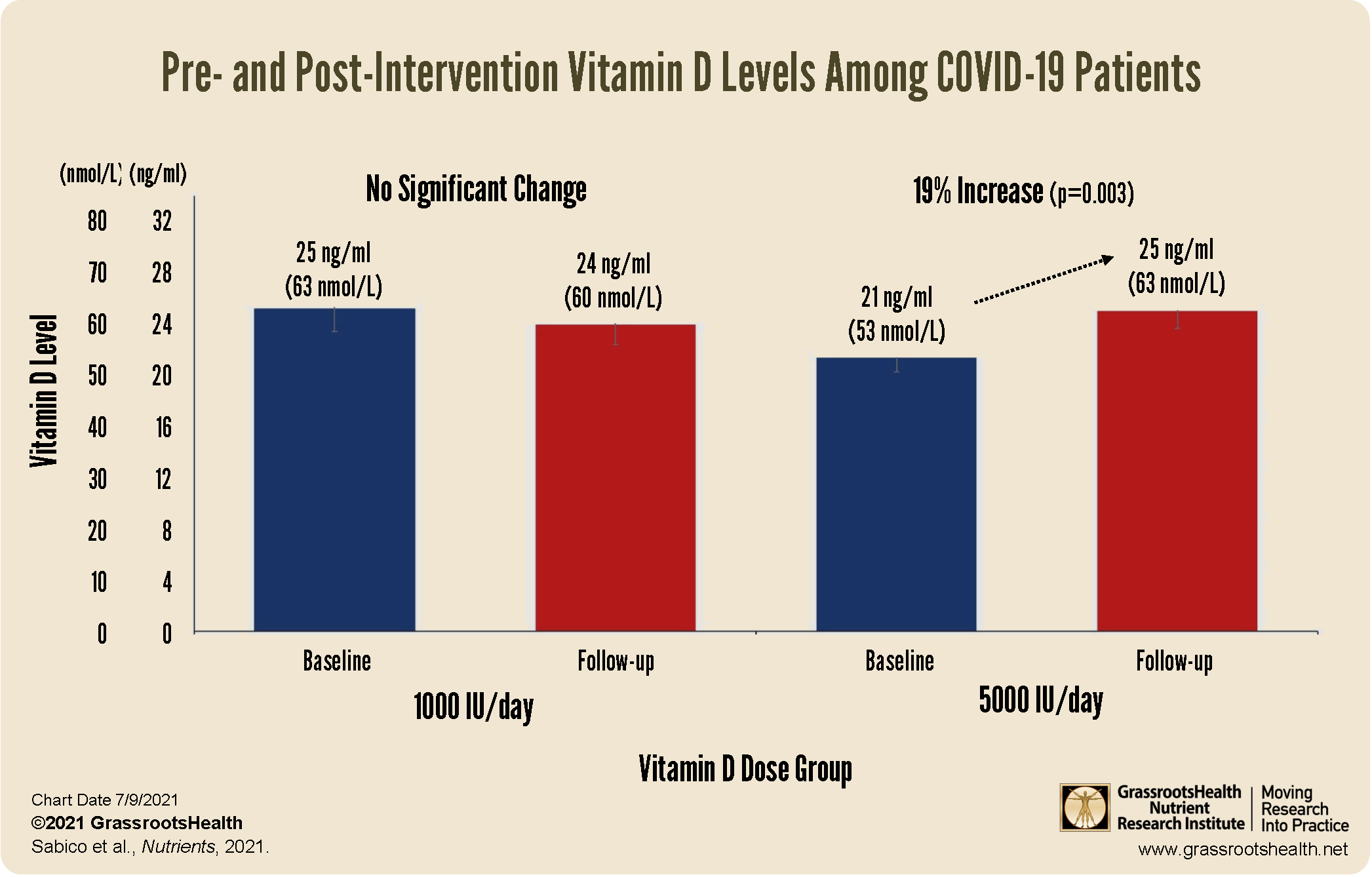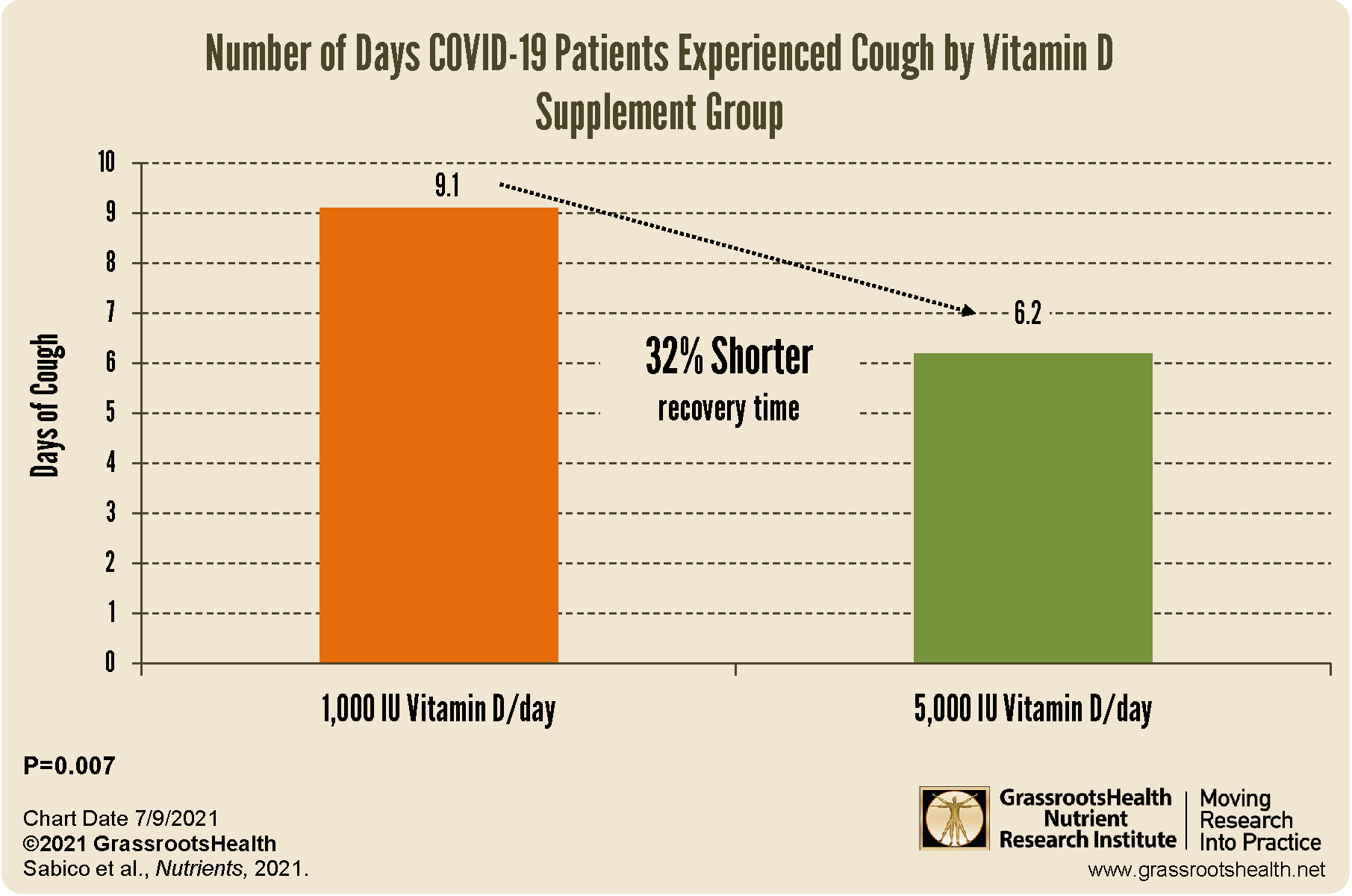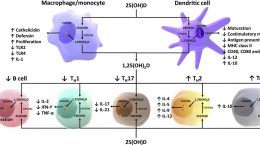Published on July 14, 2021
5000 IU vitamin D per day shown to have greater impact on COVID-19 recovery and correcting vitamin D deficiency compared to 1000 IU per day
 The immune system relies on vitamin D for both innate and adaptive immune function, so much so that the body’s demand for vitamin D increases during acute infections. Without enough vitamin D available, especially during certain acute respiratory infections, the immune response can become hindered, leading to an increased risk of severe symptoms, complications, and death.
The immune system relies on vitamin D for both innate and adaptive immune function, so much so that the body’s demand for vitamin D increases during acute infections. Without enough vitamin D available, especially during certain acute respiratory infections, the immune response can become hindered, leading to an increased risk of severe symptoms, complications, and death.
A case study by GrassrootsHealth demonstrated how vitamin D levels dropped just before an acute respiratory infection, even with consistent supplementation. This indicates the body’s increased demand for and use of available vitamin D [in the form of 25(OH)D] during the immune response.
Meta-Analysis of Vitamin D’s Association with COVID-19 Disease and Outcomes
A review by Petrelli et al., which included 43 studies, demonstrated the importance of maintaining healthy vitamin D levels, especially for the immune response against COVID-19. The review found a 50% increased risk of COVID-19 infection, a 160% increased risk of severe COVID-19 (defined as the need for intensive care and/or mechanical ventilation), and a 22% higher risk of death among those with vitamin D levels below 20 ng/ml (50 nmol/L) compared to those whose levels were 20 ng/ml or higher. Vitamin D supplementation of various doses was also found to reduce the risk of severe COVID-19 disease by 73% and death by 59%.
Randomized Controlled Trial Demonstrates Difference in Outcomes by Dose
It is important to note that using a single recommended dose may not always provide the benefits vitamin D can offer. To demonstrate this, a new randomized controlled trial by Sabico et al. compared the effects of two weeks of supplementation with either 5000 IU vitamin D per day or 1000 IU vitamin D per day for individuals hospitalized with mild to moderate COVID-19. 69 individuals who were not currently supplementing with vitamin D were randomized into each group, and symptoms were monitored beginning at hospital admission until full recovery. Full recovery was defined as 10 days after the onset of symptoms, plus at least 3 days without fever or respiratory symptoms (or 3 days without symptoms along with a negative RT-PCR test).
What did the study find?
At the beginning of the study, all participants had vitamin D levels below 30 ng/ml (75 nmol/L) with 55% having levels below 20 ng/ml (50 nmol/L). 1000 IU vitamin D per day was given to the control group, as it was considered the standard dose used for the management of vitamin D deficiency.
As illustrated in the chart above, there was no significant difference in vitamin D levels between the groups at enrollment, however, after two weeks of supplementation, vitamin D levels significantly improved only among those taking 5000 IU vitamin D per day, increasing by 19% (p=0.003).
Of note, the BMI of the group taking only 1000 IU vitamin D per day was slightly higher (32 compared to 28.2 in the 5000 IU per day group). Evidence shows that vitamin D levels are greatly affected by obesity, and the more fat a person has on their body (the higher the BMI), the higher the amount of vitamin D will be needed to reach the same target vitamin D level as someone with a lower BMI.
Those taking 5000 IU per day also had a 32% shorter recovery time compared to those taking only 1000 IU per day in resolving cough (6.2 days compared to 9.1 days, p=0.039) and a 33% shorter recovery time for ageusia, or loss of taste (11.4 days compared to 16.9 days, p=0.035).
In Conclusion
Based on the findings of this study, the authors concluded that 5000 IU vitamin D per day for two weeks was
- superior to 1000 IU vitamin D per day for resolving cough and aguesia due to COVID-19
- more effective at raising vitamin D levels among those with deficient or insufficient vitamin D at enrollment
- safe and tolerable, especially given the “acceptable upper safety dose” of 4000 IU per day
“The present findings add to the growing body of evidence on the beneficial effects of vitamin D supplementation against COVID-19, particularly among those with suboptimal levels.”
Don’t Blindly Supplement with Vitamin D… Know Your Levels!
One of the most important things to understand with vitamin D is the variability in individual dose-response; everyone responds differently to vitamin D… by up to 6 times for the same supplement amount! The only way to make sure that your target level of vitamin D has been reached is to measure the amount of vitamin D [as 25(OH)D] in your blood. If your resulting level is below your target, using the vitamin D calculator to help determine a new supplementation amount along with information provided on how to support and maintain a healthy vitamin D level (such as with co-nutrients, sun exposure, and food). Re-testing after 3 to 6 months allows you to ensure your target has been reached, or gives you the opportunity to adjust your routine as needed.
Other Nutrients are Important for Your Immune Response
Nutrients work synergistically to help immune cells carry out specific actions during an immune response, so it is important to ensure adequate intake of these nutrients, especially when fighting an infection. Omega-3s, magnesium, zinc and selenium, and other nutrients have shown to be beneficial in how the body responds to COVID-19 and other illnesses.
Make Sure You Are Getting Enough Vitamin D and Other Important Nutrients
 Having and maintaining healthy vitamin D levels and other nutrient levels can help improve your health now and for your future. Choose which to measure, such as your vitamin D, omega-3s, and essential minerals including magnesium and zinc, by creating your custom home test kit today. Take steps to improve the status of each of these measurements to benefit your overall health. You can also track your own intakes, symptoms and results to see what works best for YOU.
Having and maintaining healthy vitamin D levels and other nutrient levels can help improve your health now and for your future. Choose which to measure, such as your vitamin D, omega-3s, and essential minerals including magnesium and zinc, by creating your custom home test kit today. Take steps to improve the status of each of these measurements to benefit your overall health. You can also track your own intakes, symptoms and results to see what works best for YOU.
Enroll and test your levels today, learn what steps to take to improve your status of vitamin D (see below) and other nutrients and blood markers, and take action! By enrolling in the GrassrootsHealth projects, you are not only contributing valuable information to everyone, you are also gaining knowledge about how you could improve your own health through measuring and tracking your nutrient status, and educating yourself on how to improve it.
Help everyone Move Research into Practice with vitamin D and other nutrients! As a special birthday gift to everyone, in honor of the science, we have created a special scholarship fund for anyone to donate to that will go towards helping others participate. Your donation will allow anyone to get help with funding their participation when they need it.
Text-to-give: Text Daction to 44321 to add to our Scholarship Fund.







